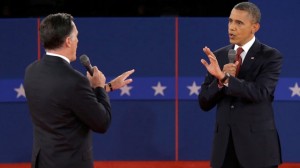 When it comes to the future of energy in the United States, the difference between President Obama and Gov. Romney is clear. While the two agree on striving for American “energy independence,” they clashed over the issues of high gas prices and increasing domestic drilling in last night’s town hall Presidential debate.
When it comes to the future of energy in the United States, the difference between President Obama and Gov. Romney is clear. While the two agree on striving for American “energy independence,” they clashed over the issues of high gas prices and increasing domestic drilling in last night’s town hall Presidential debate.
President Obama advocates supplementing the drilling we are already doing in the U.S., which he says is more than ever before, by developing and investing in renewables such as wind and solar energy.
Gov. Romney insists that Obama hasn’t pursued enough drilling, that federal production has dropped, and that an increase in drilling on American soil will promise a direct reduction in prices at the pump. However, Romney’s arguments twist the facts. While federal oil production and sales slowed under Obama in 2010, it was due to the halt in offshore drilling after the worst oil spill in history (BP in the Gulf of Mexico, April 2010). According to a recent study published by the Energy Department, oil production has in fact increased overall under Obama.
Additionally, Romney’s claim that increasing U.S. oil production will reduce gas prices is more fantasy than fact. His claims are in direct contradiction to recent reports that show no matter how much we increase domestic drilling, lower prices are unlikely and far from guaranteed. Even with domestic production on the rise, oil remains a complex global commodity, with price values beyond the influence of a single president.
Sources: Fact-Checking the Second Presidential Debate, U.S. drilling won’t lower gas prices, study shows, More Drilling Won’t Lower Gas Prices. Image: Oct. 16, 2012, in Hempstead, N.Y. (Charlie Neibergall/AP Photo).







I see You’re truly a good webmaster. This web site loading velocity is
incredible. It kind of feels that you are doing any unique trick.
Also, the contents are masterpiece. you have performed a excellent process in this matter!
Similar here: <a href="[Link deleted]online and also
here: <a href="[Link deleted]sklep
Hey! Do you know if they make any plugins to help with Search Engine Optimization? I’m trying to get my website to rank for some targeted keywords
but I’m not seeing very good results. If you know of any
please share. Thank you! You can read similar art here: <a href="[Link deleted]Portfolio
link:Situs slot deposit dana 10k slot gacor alay4d sebagai situs judi slot online terpercaya deposit dana 10000 terima deposit dana tanpa potongan. alay4d memberikan berbagai permainan judi jenis slot online, togel online, casino online, poker online, judi bola, dan masih banyak permainan judi online lainnya yang sudah kami sediakan.
link:Situs slot deposit dana 10k slot gacor alay4d sebagai situs judi slot online terpercaya deposit dana 10000 terima deposit dana tanpa potongan. alay4d memberikan berbagai permainan judi jenis slot online, togel online, casino online, poker online, judi bola, dan masih banyak permainan judi online lainnya yang sudah kami sediakan.
Hey there! Do you know if they make any plugins to assist with Search Engine
Optimization? I’m trying to get my website to
rank for some targeted keywords but I’m not seeing very good results.
If you know of any please share. Many thanks!
You can read similar art here: <a href="[Link deleted]Building